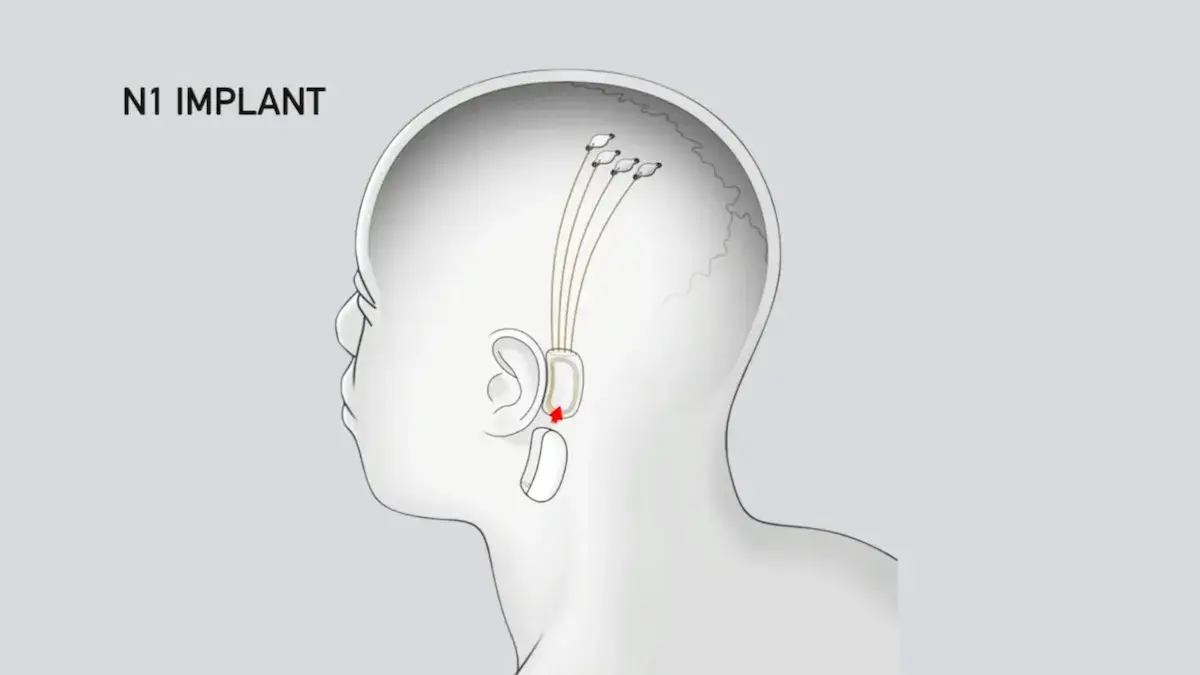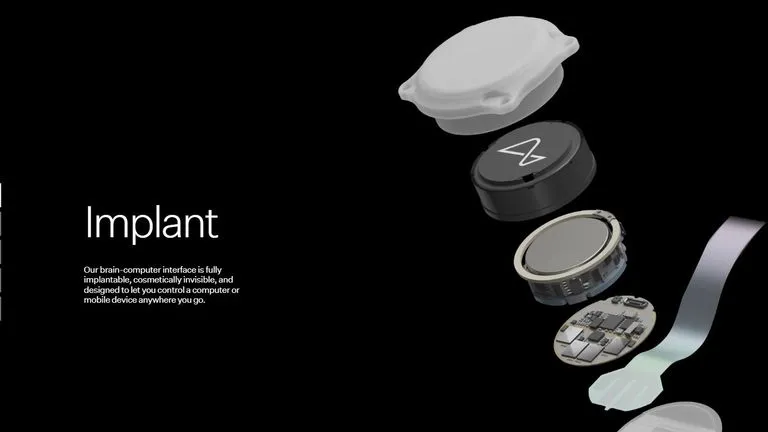Brain implants, also known as neural implants or brain-computer interfaces (BCIs), are revolutionary devices that have the capability to interface with the human brain. These implants are designed to enhance human capabilities, treat neurological disorders, and enable seamless communication between humans and machines.
Neuralink’s recent milestone achievement of successfully testing a brain chip implant on a human is a significant step forward in the field of neurotechnology. This breakthrough brings us closer to merging artificial intelligence with the human brain, opening up a world of possibilities.
Brain implants work by placing a small chip, about the size of a coin, into the individual’s skull. This chip contains thousands of electrodes that can monitor and stimulate brain activity. By interfacing directly with the brain, these implants have the potential to decode neural signals and translate them into actions, effectively bridging the gap between the mind and technology.
The applications of brain implants are vast and diverse. They hold great promise in the field of healthcare, offering potential treatments for neurological disorders such as Parkinson’s disease, epilepsy, and spinal cord injuries. By stimulating specific regions of the brain, these implants can potentially alleviate symptoms and improve the quality of life for patients.
Furthermore, brain implants have the potential to enhance human capabilities beyond their natural limitations. Imagine being able to learn new skills at an accelerated rate or having direct access to information without the need for external devices. These implants could revolutionize education, allowing individuals to acquire knowledge and expertise in a fraction of the time it would traditionally take.
Seamless communication between humans and machines is another exciting possibility offered by brain implants. With a brain chip implant, individuals could control devices using their thoughts alone, eliminating the need for physical interfaces. This could have profound implications for individuals with disabilities, enabling them to regain independence and interact with the world in new and meaningful ways.
Overall, brain implants have the potential to unlock the full potential of the human mind and reshape the way we interact with technology. As Situs slot Neuralink and other companies continue to push the boundaries of neurotechnology, we are on the brink of a new era in human-machine integration.

The Significance of Neuralink’s Milestone Achievement
Neuralink’s successful testing of a brain chip implant on a human marks a significant milestone in the field of neurotechnology. This achievement not only showcases the progress made by the company but also highlights the immense potential of brain implants in revolutionizing various aspects of human life.
Elon Musk, the visionary entrepreneur behind Neuralink, has always been at the forefront of innovation. With this breakthrough, Musk further solidifies his position as a trailblazer in the tech industry. By merging artificial intelligence with the human brain, Musk aims to enhance human capabilities and push the boundaries of what is possible.
The successful testing of the brain chip implant demonstrates the feasibility of the technology and paves the way for further advancements. It showcases the remarkable progress made by Neuralink and its team of researchers, engineers, and neuroscientists. This achievement brings us closer to a future where brain implants are not only a possibility but a reality.
The implications of Neuralink’s milestone achievement are far-reaching. From healthcare to education, productivity to communication, the potential benefits are immense. By enabling direct communication between the brain and external devices, brain implants have the power to transform lives and push the boundaries of human potential.
Furthermore, Neuralink’s breakthrough has the potential to shape the future of humanity. As brain implants become more advanced and accessible, the line between humans and machines begins to blur. This raises profound questions about what it means to be human and what the future holds for our species.
In conclusion, Neuralink’s milestone achievement is a testament to the power of human ingenuity and innovation. With brain implants, we are on the cusp of a new era where the boundaries of the human mind are expanded, and the possibilities are endless.
How the Brain Chip Implant Works
The brain chip implant developed by Neuralink is a remarkable piece of technology that interfaces directly with the human brain. This implant, about the size of a coin, contains thousands of electrodes that can monitor and stimulate brain activity.
The implantation process begins with a small incision in the individual’s skull. The brain chip is then carefully placed in a specific region of the brain, depending on the desired application. The electrodes on the chip are designed to interface with the neurons in the brain, allowing for bidirectional communication.
Once the chip is implanted, it can monitor brain activity in real-time. The electrodes pick up electrical signals generated by the neurons and send them to an external device for processing. These signals can then be decoded and translated into meaningful actions or commands.
In addition to monitoring brain activity, the brain chip implant can also stimulate the neurons. By sending electrical impulses to specific regions of the brain, the implant can effectively modulate brain activity. This has the potential to treat neurological disorders by restoring normal brain function or alleviating symptoms.
The interface between the brain chip implant and external devices is wireless, allowing for seamless communication. Through a combination of advanced software algorithms and machine learning, the implant can interpret the user’s intentions and translate them into actions. This enables individuals to control external devices using their thoughts alone.
The brain chip implant is designed to be safe and durable. The materials used are biocompatible, meaning they are not harmful to the body and do not cause adverse reactions. The implant is also designed to be long-lasting, with the potential for years of use before replacement is necessary.
Overall, the brain chip implant developed by Neuralink represents a significant advancement in neurotechnology. By directly interfacing with the brain, this implant opens up new possibilities for treating neurological disorders, enhancing human capabilities, and enabling seamless communication between humans and machines.
Potential Benefits and Implications of Brain Chip Implants
Brain chip implants, such as the one developed by Bandar slot online Neuralink, hold tremendous potential for a wide range of applications. From healthcare to productivity, education to communication, the benefits and implications of this technology are vast and diverse.
One of the most significant potential benefits of brain chip implants is their ability to treat neurological disorders. By directly interfacing with the brain, these implants can modulate neural activity, potentially restoring normal brain function or alleviating symptoms. Conditions such as Parkinson’s disease, epilepsy, and spinal cord injuries could be targeted with precision, offering new hope for patients.
Brain chip implants also have the potential to enhance human capabilities beyond their natural limitations. Imagine being able to learn new skills at an accelerated rate or having instant access to information without the need for external devices. With a brain chip implant, individuals could acquire knowledge and expertise in a fraction of the time it would traditionally take.
Seamless communication between humans and machines is another exciting possibility offered by brain chip implants. By decoding neural signals and translating them into actions, individuals could control devices using their thoughts alone. This could revolutionize productivity, allowing for hands-free operation and increased efficiency.
Furthermore, brain chip implants have the potential to improve the quality of life for individuals with disabilities. By enabling direct communication between the brain and external devices, these implants could help individuals regain independence and interact with the world in new and meaningful ways.
However, it is important to consider the ethical considerations and concerns surrounding brain chip implants. Issues such as privacy, consent, and the potential for misuse need to be addressed and carefully regulated to ensure the responsible development and deployment of this technology.
In conclusion, the potential benefits and implications of brain chip implants are vast and exciting. From healthcare to productivity, education to communication, this technology has the power to revolutionize various aspects of human life. As we continue to explore the possibilities, it is crucial to proceed with caution and prioritize ethical considerations to ensure a future that is both beneficial and responsible.
Ethical Considerations and Concerns Surrounding Brain Chip Implants
The development and deployment of brain chip implants, such as the one developed by Neuralink, raise important ethical considerations and concerns. As this technology advances, it is crucial to address these issues to ensure responsible and ethical use.
One of the primary concerns surrounding brain chip implants is privacy. By directly interfacing with the brain, these implants have access to the most intimate and personal aspects of an individual’s thoughts and emotions. Protecting this data and ensuring its confidentiality is of utmost importance to prevent abuse or unauthorized access.
Consent is another critical ethical consideration. Before undergoing brain chip implantation, individuals must fully understand the potential risks and benefits of the procedure. Informed consent should be obtained, ensuring that individuals have the autonomy to make decisions about their own bodies and minds.
The potential for misuse is also a concern with brain chip implants. As this technology becomes more advanced, there is the possibility of it being used for nefarious purposes, such as surveillance or mind control. Strict regulations and oversight are necessary to prevent misuse and ensure that this technology is used for the betterment of humanity.
Societal implications must also be considered. As brain chip implants become more prevalent, there may be a divide between those who have access to the technology and those who do not. This could exacerbate existing inequalities and create new forms of discrimination. Efforts must be made to ensure equal access and prevent the further marginalization of disadvantaged groups.
Additionally, there are philosophical and existential questions raised by brain chip implants. What does it mean to be human when our minds can be enhanced or altered by technology? How does this impact our sense of self and identity? These questions are complex and require thoughtful consideration as we navigate the integration of technology into our lives.
In conclusion, the ethical considerations and concerns surrounding brain chip implants are significant. Privacy, consent, misuse, societal implications, and philosophical questions must all be carefully addressed to ensure responsible and ethical development and deployment of this technology. By doing so, we can harness the potential benefits of brain implants while safeguarding the well-being and autonomy of individuals.
The Future of Neuralink and Brain-Computer Interfaces
Neuralink, under the visionary leadership of Elon Musk, is at the forefront of developing brain-computer interfaces (BCIs) and advancing the field of neurotechnology. The success of Neuralink’s brain chip implant marks a significant milestone, but it is just the beginning of a much larger journey.
The future of Neuralink holds tremendous potential. The company aims to continue refining and improving the brain chip implant, making it safer, more durable, and more capable. As the technology evolves, Neuralink envisions a future where brain implants are accessible to a wider population, bringing the benefits of neurotechnology to more individuals.
One of the key areas of focus for Neuralink is healthcare. By further developing the brain chip implant, the company aims to provide effective treatments for neurological disorders. Through ongoing research and collaboration with medical professionals, Neuralink seeks to unlock new possibilities for improving the lives of patients.
Another area of exploration for Neuralink is the enhancement of human capabilities. By integrating artificial intelligence with the human brain, the company aims to push the boundaries of what is possible. This could revolutionize education, productivity, and the way we interact with technology, enabling individuals to achieve new levels of performance and efficiency.
Furthermore, Neuralink is committed to addressing the ethical considerations and concerns surrounding brain implants. The company recognizes the importance of privacy, consent, and responsible use of this technology. By actively engaging with experts, policymakers, and the public, Neuralink aims to shape the future of brain-computer interfaces in a way that is ethical, transparent, and beneficial for all.
Neuralink is not alone in its pursuit of brain-computer interfaces. Other companies and research institutions are also exploring this exciting field. The collective efforts of these organizations are driving the advancement of neurotechnology, pushing the boundaries of what is possible and unlocking new frontiers.
In the future, we can expect to see further advancements in brain implants and brain-computer interfaces. As the technology becomes more refined and accessible, we will witness new applications and possibilities emerge. The integration of artificial intelligence and the human brain has the potential to reshape society and open up new opportunities for human advancement.
In conclusion, the future of Neuralink and brain-computer interfaces is filled with promise. With ongoing research, development, and collaboration, we are on the brink of a new era in human-machine integration. As this technology evolves, it is crucial to prioritize ethical considerations and ensure responsible use to create a future that benefits all of humanity.

Other Companies and Research in the Field of Brain Implants
While Neuralink is leading the way in the development of brain implants and brain-computer interfaces, there are several other companies and research institutions actively exploring this field. These organizations are driving innovation, pushing the boundaries of what is possible, and contributing to the advancement of neurotechnology.
One notable company in the field of brain implants is Kernel. Founded by entrepreneur and neuroscientist Bryan Johnson, Kernel aims to develop advanced neural interfaces to improve human cognition. The company is focused on understanding the brain and creating technologies that can enhance memory, intelligence, and overall brain function.
Another company making waves in the field is CTRL-Labs. Their focus is on creating non-invasive brain-computer interfaces that can translate neural signals into digital commands. By using a combination of machine learning and advanced algorithms, CTRL-Labs aims to revolutionize human-computer interaction, allowing individuals to control devices using their thoughts alone.
Research institutions such as the University of California, Berkeley, and Stanford University are also actively involved in studying brain implants and their potential applications. These institutions have dedicated research labs focused on neurotechnology, bringing together experts from various disciplines to explore the possibilities and challenges of brain-computer interfaces.
Collaboration between these organizations is crucial for pushing the field forward. By sharing knowledge, resources, and expertise, researchers and companies can accelerate progress and unlock new possibilities. This collective effort is driving the advancement of brain implants and brain-computer interfaces, bringing us closer to a future where humans can seamlessly interact with technology.
In conclusion, while Neuralink is at the forefront of brain implants and brain-computer interfaces, there are several other companies and research institutions actively contributing to this field. The collective efforts of these organizations are driving innovation and pushing the boundaries of what is possible. Through collaboration and continued research, we can expect to see further advancements that will revolutionize the way we interact with technology.
In conclusion, Neuralink’s brain chip implants represent a remarkable leap in human-machine interaction. As we journey towards an exciting future, unlocking new potentials and addressing ethical considerations will be paramount. If you found this article intriguing, we invite you to delve into our piece about the Poco X6, exploring the latest in cutting-edge technology. Thank you for joining us on this exploration of innovation and possibility.




